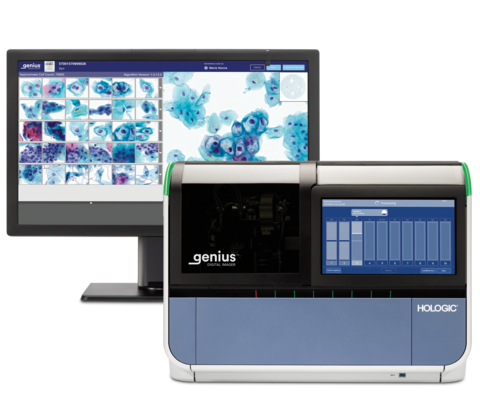Digital Cytology System Delivers Next-Gen Technology for Pap Testing
Posted on 07 Feb 2024
Cervical cancer, when detected early, is both preventable and highly treatable. Therefore, early detection and identification are crucial for effective prevention and treatment. Co-testing, which combines a Pap test with an HPV test, has proven to be the most sensitive method for cervical cancer screening, outperforming each test when used individually. In a Pap test, a sample typically collected at an OB-GYN office is sent to a lab, where the cervical cells are placed on a glass slide. Traditionally, this slide is examined under a microscope. Now, a state-of-the-art diagnostic system for cervical cancer screening uses advanced imaging to digitally image the glass slides and applies novel artificial intelligence (AI) to pinpoint the cells that cytologists and pathologists should review.
Hologic’s (Marlborough, MA, USA) Genius Digital Diagnostics System, equipped with the Genius Cervical AI algorithm, is the first and only FDA-cleared digital cytology system. It integrates AI based on deep learning with advanced volumetric imaging technology to aid in detecting pre-cancerous lesions and cervical cancer cells. The system comprises the Genius Digital Imager for capturing images, the Genius Cervical AI algorithm for analyzing images, the Genius Image Management Server for storing images, and the Genius Review Station for local or remote case review. This comprehensive system is scalable and designed to meet the current and future needs of laboratories.

In clinical studies, this new approach and technology have been shown to enhance sensitivity without reducing specificity. Notably, it achieved a 28% reduction in false negatives for high-grade squamous intraepithelial lesions and more severe conditions compared to traditional microscopic examination. The Genius Digital Diagnostics System equips laboratories to provide healthcare professionals with critical information, enabling them to make more informed and timely treatment decisions. Additionally, the system facilitates increased collaboration within labs and across healthcare settings. It allows for secure remote case reviews by cytologists and pathologists, enabling patients to benefit from the expertise of geographically diverse specialists. The Genius Digital Diagnostics System is already available commercially in Europe, Australia, and New Zealand, with its expected release in the U.S. slated for early 2024.
“Hologic is a leading innovator in women’s health with a commitment to advancing cervical and breast cancer screening technologies, from the first liquid-based cytology test to the first 3D mammography system and now the first FDA-cleared digital cytology platform,” said Jennifer Schneiders, Ph.D., President, Diagnostic Solutions at Hologic. “Our technologies have had a tremendous impact on decreasing cancer rates in women, and we are incredibly excited by the promise of Genius Digital Diagnostics. The system delivers more actionable and accurate insights for laboratories and healthcare professionals to enhance patient care.”














